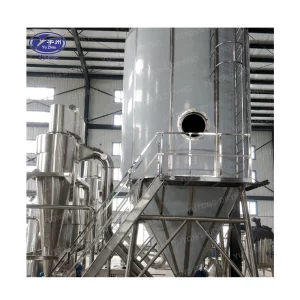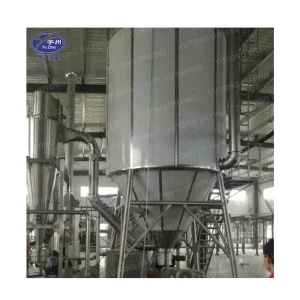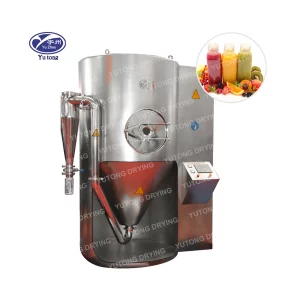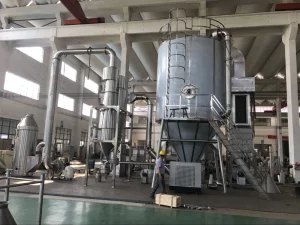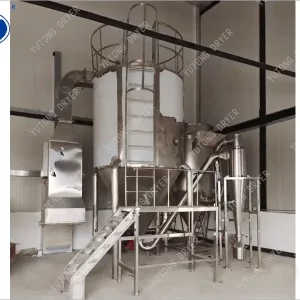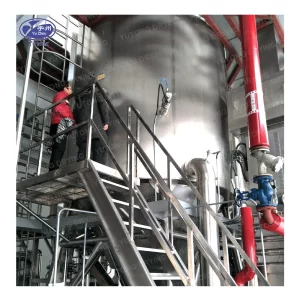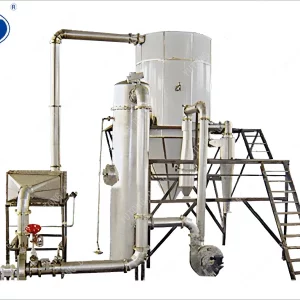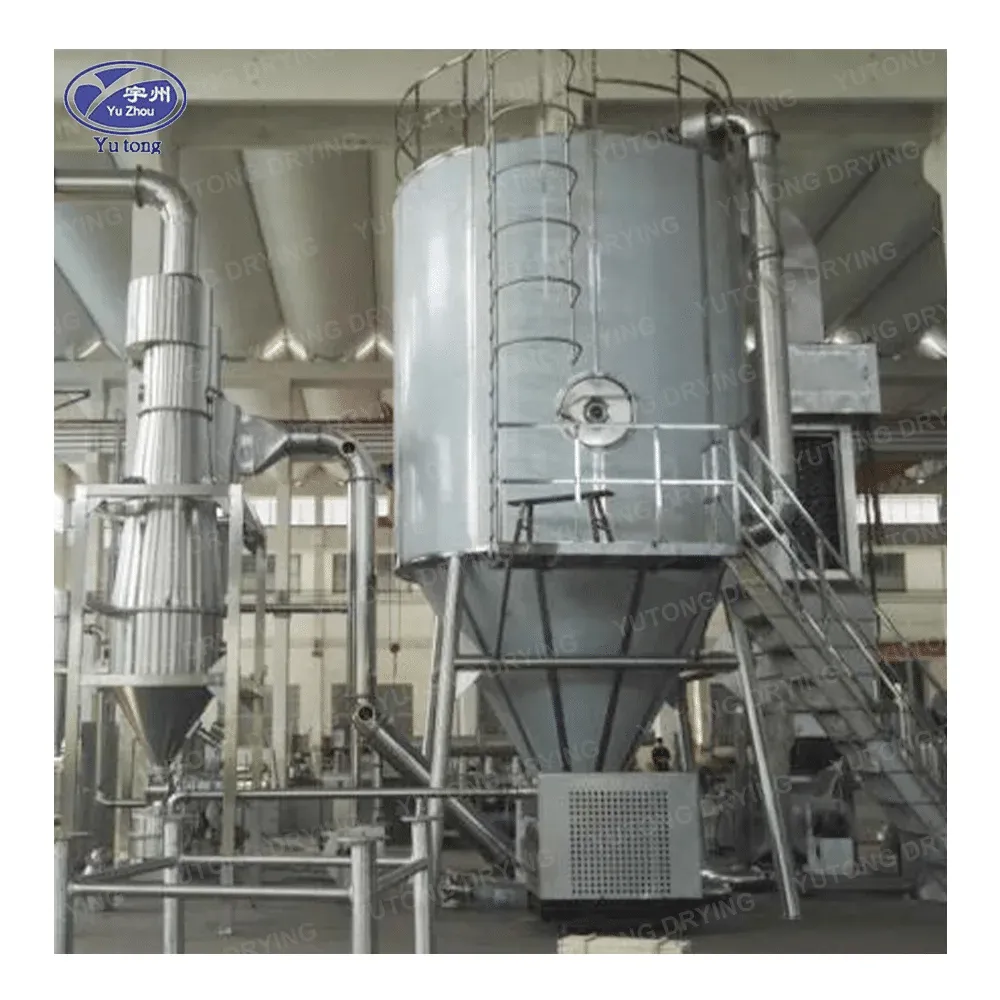The food processing industry has seen significant advancements in technology over the past few decades, with one of the most notable innovations being the fruit powder spray drying machine. This advanced piece of equipment is designed to convert liquid or slurry fruit extracts into a fine, dry powder form, preserving the nutrients and flavors while extending shelf life. In this comprehensive article, we will delve into the intricacies of fruit powder spray drying machines, exploring their operation, benefits, applications, and the future of this technology.
Understanding the Spray Drying Process
Spray drying is a method used for the dehydration of liquids, suspensions, or slurries into a dry powder form. It involves atomizing the feed material into tiny droplets using a nozzle or disc, which are then sprayed into a hot air chamber. The heat evaporates the moisture from the droplets almost instantly, leaving behind a dry powder that falls to the bottom of the chamber. The process is highly efficient and can be customized to suit various requirements, making it ideal for the production of fruit powders.
Key Components of a Fruit Powder Spray Drying Machine
A typical fruit powder spray drying machine consists of several essential components:
1. Atomizer: The atomizer is responsible for breaking down the liquid or slurry fruit extract into fine droplets. There are two main types of atomizers: pressure nozzles and rotary discs. Pressure nozzles use high-pressure air or gas to atomize the liquid, while rotary discs spin at high speeds to create a centrifugal force that atomizes the feed material.
2. Drying Chamber: The drying chamber is where the atomized droplets are exposed to hot air, causing the moisture to evaporate. The chamber is usually cylindrical in shape and is designed to maximize the contact time between the droplets and the hot air, ensuring efficient drying.
3. Air Handling System: The air handling system is responsible for providing the hot air required for the drying process. It includes a heater, fan, and filter to ensure that the air is clean, dry, and at the appropriate temperature.
4. Cyclone Separator: The cyclone separator is used to separate the dried powder from the exhaust air. As the air exits the drying chamber, it carries the dry powder particles with it. The cyclone separator uses centrifugal force to separate the powder from the air, allowing it to fall into a collection container.
5. Dust Collector: The dust collector is an optional component that helps to remove any remaining fine particles from the exhaust air before it is released into the atmosphere. This ensures that the air is clean and free from contaminants.
Benefits of Fruit Powder Spray Drying Machines
Fruit powder spray drying machines offer numerous advantages over traditional drying methods:
1. High Efficiency: Spray drying is a rapid process that can dry large volumes of liquid or slurry in a short amount of time. This makes it highly efficient and cost-effective for commercial-scale fruit powder production.
2. Preservation of Nutrients and Flavors: The quick drying process helps to preserve the natural nutrients, vitamins, and flavors of the fruit, resulting in a high-quality powder that retains its original properties.
3. Extended Shelf Life: The low moisture content of the dried powder significantly extends its shelf life, making it easier to store and transport without the risk of spoilage.
4. Customizable Powder Properties: Spray drying allows for the customization of powder properties such as particle size, moisture content, and bulk density, enabling manufacturers to tailor the final product to specific applications.
Applications of Fruit Powder Spray Drying Machines
Fruit powder spray drying machines have a wide range of applications in the food, beverage, pharmaceutical, and cosmetic industries:
1. Food Industry: Fruit powders are used as ingredients in various food products such as baked goods, confectionery, cereals, and snacks. They can also be used to create fruit-flavored coatings, glazes, and fillings.
2. Beverage Industry: Fruit powders are popular for creating fruit-flavored beverages, including soft drinks, juices, and sports drinks. They can also be used to make instant drink mixes and powdered milk substitutes.
3. Pharmaceutical Industry: Fruit powders are used in the production of dietary supplements, vitamins, and functional foods due to their high nutrient content.
4. Cosmetic Industry: Fruit powders are used in the formulation of skincare products, such as face masks, scrubs, and powders, due to their natural properties and antioxidant benefits.
Future Trends in Fruit Powder Spray Drying Technology
As technology continues to advance, so too does the fruit powder spray drying machine. Some emerging trends in this field include:
1. Energy-Efficient Designs: Newer models of spray drying machines are becoming more energy-efficient, reducing the overall carbon footprint of the process.
2. Automation and Control Systems: Advanced control systems are being integrated into spray drying machines, allowing for precise monitoring and adjustment of process parameters to optimize performance and product quality.
3. Modular Designs: Modular designs allow for easy customization and scalability of spray drying machines, making them suitable for a wider range of applications and production volumes.
4. Sustainable Materials: The use of sustainable materials in the construction of spray drying machines is becoming increasingly important, as manufacturers strive to reduce their environmental impact.
Fruit powder spray drying machines are revolutionizing the food processing industry by offering an efficient, versatile, and customizable solution for the production of high-quality fruit powders. With numerous applications across various industries, these machines are playing a crucial role in meeting the growing demand for natural, nutrient-rich ingredients. As technology continues to evolve, we can expect to see even more advanced and sustainable spray drying machines that further enhance the capabilities of the food processing industry.
FAQs
Q1: What is the difference between spray drying and freeze drying?
A1: Spray drying and freeze drying are both methods used for dehydration, but they differ in their processes and applications. Spray drying involves atomizing a liquid or slurry into a hot air chamber, resulting in a rapid evaporation of moisture and the formation of a dry powder. Freeze drying, on the other hand, involves freezing the material and then removing the ice through sublimation, leaving behind a dry, porous structure. Spray drying is typically used for the production of fruit powders, while freeze drying is commonly used for freeze-dried fruits, vegetables, and other food products.
Q2: Can spray drying machines be used for other types of food powders besides fruit powders?
A2: Yes, spray drying machines can be used for the production of various food powders, including dairy powders (such as whey, casein, and milk powders), vegetable powders, protein powders, and flavoring agents. The versatility of spray drying machines allows them to be adapted to different feed materials and desired powder properties.
Q3: How do I choose the right spray drying machine for my application?
A3: When choosing a spray drying machine, consider factors such as the type and volume of feed material, desired powder properties, available space, budget, and energy efficiency. Consulting with a reputable manufacturer or supplier can help you determine the best machine for your specific needs.
Q4: Are there any safety concerns associated with using a fruit powder spray drying machine?
A4: Like any industrial machinery, fruit powder spray drying machines should be operated according to the manufacturer’s guidelines and safety protocols. Ensure proper training for operators, regular maintenance, and adherence to health and safety regulations to minimize risks.
Q5: Can I use a fruit powder spray drying machine for small-scale production?
A5: While many spray drying machines are designed for large-scale commercial production, there are smaller, laboratory-scale models available for research and development purposes or small-scale production. These machines often feature modular designs that can be scaled up as production requirements grow.
In conclusion, fruit powder spray drying machines are an indispensable tool in the food processing industry, offering a fast, efficient, and customizable method for producing high-quality fruit powders. As technology advances, we can expect to see even more sophisticated and sustainable machines that further enhance the capabilities of the industry.

